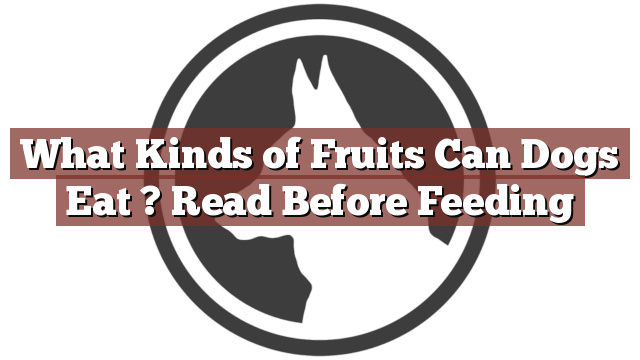Understanding Your Dog’s Dietary Needs
When it comes to the dietary needs of our furry friends, it is important to remember that dogs are primarily carnivores. Their bodies are designed to thrive on a diet rich in animal protein. However, that doesn’t mean that fruits have no place in their diet. In fact, certain fruits can provide various health benefits for dogs. Before incorporating fruits into your dog’s diet, it is important to understand which ones are safe and beneficial for them to consume.
What Kinds of Fruits Can Dogs Eat? Read Before Feeding
Can dogs eat fruits? The answer is yes, but not all fruits are safe for them. Some fruits can be toxic to dogs and may lead to serious health issues. It is crucial to be aware of which fruits are safe and suitable for your furry friend to consume.
Here are some fruits that are generally safe for dogs to eat:
-
Apples: Apples are a great source of vitamins A and C, as well as fiber. Make sure to remove the seeds and core, as these can be harmful to dogs.
-
Blueberries: Blueberries are packed with antioxidants, which can promote a healthy immune system. They are also low in calories, making them a great guilt-free treat for your dog.
-
Watermelon: This juicy fruit is a wonderful source of hydration during hot summer days. Just remember to remove the seeds and rind before offering it to your dog.
-
Bananas: Bananas are a fantastic source of potassium, vitamin C, and vitamin B6. They are also high in fiber, making them beneficial for dogs with digestive issues.
-
Strawberries: Strawberries contain antioxidants and are a good source of vitamin C. They make a delicious and nutritious treat for your furry companion.
Pros and Cons of Feeding Fruits to Dogs
Feeding fruits to your dog can have several benefits. Fruits are a natural source of vitamins, minerals, and fiber that can support your dog’s overall health. The antioxidants found in many fruits can help boost their immune system and protect against diseases. Additionally, fruits can serve as a healthy alternative to high-calorie treats, which can aid in weight management for overweight dogs.
However, it is important to remember that fruits should not replace a balanced diet for dogs. While fruits can offer nutritional benefits, they should only make up a small portion of your dog’s overall diet. It is always a good idea to consult with your veterinarian before introducing new foods into your dog’s diet, especially if they have any pre-existing health conditions.
In Conclusion
In conclusion, dogs can safely consume certain fruits as part of a balanced diet. Apples, blueberries, watermelon, bananas, and strawberries are some fruits that are generally safe for dogs to eat. However, it is crucial to remember that not all fruits are safe for dogs, and some can even be toxic. Always remove any seeds, cores, or rinds before offering fruits to your dog, as these can pose a choking hazard or lead to digestive issues. It is also important to remember that fruits should only make up a small portion of your dog’s diet and should not replace their primary source of animal protein. As always, consult with your veterinarian for personalized advice regarding your dog’s specific dietary needs.
Thank you for taking the time to read through our exploration of [page_title]. As every dog lover knows, our furry friends have unique dietary needs and responses, often varying from one canine to another. This is why it's paramount to approach any changes in their diet with caution and knowledge.
Before introducing any new treats or making alterations to your dog's diet based on our insights, it's crucial to consult with a veterinarian about [page_title]. Their expertise ensures that the choices you make are well-suited to your particular pet's health and well-being.
Even seemingly harmless foods can sometimes lead to allergic reactions or digestive issues, which is why monitoring your dog after introducing any new food item is essential.
The content provided here on [page_title] is crafted with care, thorough research, and a genuine love for dogs. Nevertheless, it serves as a general guideline and should not be considered a substitute for professional veterinary advice.
Always prioritize the expert insights of your veterinarian, and remember that the health and happiness of your furry companion come first.
May your journey with your pet continue to be filled with joy, love, and safe culinary adventures. Happy reading, and even happier snacking for your canine friend!

